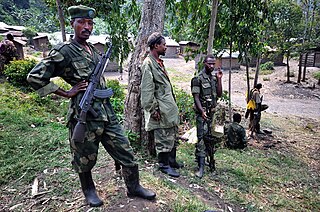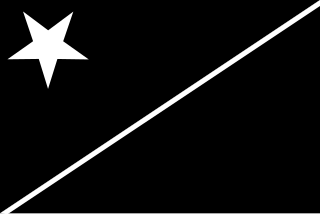The Armed Forces of the Democratic Republic of the Congo is the state organisation responsible for defending the Democratic Republic of the Congo. The FARDC was rebuilt patchily as part of the peace process which followed the end of the Second Congo War in July 2003.

North Kivu is a province bordering Lake Kivu in the eastern Democratic Republic of the Congo. Its capital is Goma.

The Kivu conflict began in 2004 in the eastern Congo as an armed conflict between the military of the Democratic Republic of the Congo (FARDC) and the Hutu Power group Democratic Forces for the Liberation of Rwanda (FDLR) in the Democratic Republic of the Congo. It has broadly consisted of three phases, the third of which is an ongoing conflict. Prior to March 2009, the main combatant group against the FARDC was the National Congress for the Defence of the People (CNDP). Following the cessation of hostilities between these two forces, rebel Tutsi forces, formerly under the command of Laurent Nkunda, became the dominant opposition to the government forces.
Walikale Territory is a territory located within the Congolese province of North Kivu, in the eastern regions of the Democratic Republic of the Congo. The headquarters are in the town of Walikale. The locality is situated between Bukavu and Lubutu on DR Congo National Road No. 2 in the valley of the river Lowa, 135 km to the west of Goma.
Army General Gabriel Amisi Kumba was Chief of Staff of the Forces Terrestres, the army of the Democratic Republic of the Congo. Amisi was a former Forces armees Zairoises (FAZ) officer who was recruited into the Alliance of Democratic Forces for the Liberation of Congo (AFDL) in 1996. During the Second Congo War, Amisi was assistant chief of staff for logistics of the Rally for Congolese Democracy (RCD-G). This position was the origin of his nickname, as T-4 was the abbreviation for his position. He was implicated by Human Rights Watch in the execution of soldier Joe Lona Bifuko and in the torture of prisoners in the ANC military intelligence detention centre in Goma in 2001.
Kanyabayonga is a town in Lubero Territory, North Kivu province, Democratic Republic of the Congo. The town has suffered from continued violence between the army and rival militias since 1993.

Walikale is a town in the North Kivu Province of the Democratic Republic of the Congo (DRC). It is the administrative center of the Walikale Territory.

The March 23 Movement, often abbreviated as M23 and also known as the Congolese Revolutionary Army, is a rebel military group that is for the most part formed of ethnic Tutsi. Based in eastern areas of the Democratic Republic of the Congo (DRC), it operates mainly in the province of North Kivu. The M23 rebellion of 2012 to 2013 against the DRC government led to the displacement of large numbers of people. On 20 November 2012, M23 took control of Goma, a provincial capital with a population of a million people, but it was requested to evacuate it by the International Conference on the Great Lakes Region because the DRC government had finally agreed to negotiate. In late 2012, Congolese troops, along with UN troops, retook control of Goma, and M23 announced a ceasefire and said that it wanted to resume peace talks.
Lubero Territory is a territory in North Kivu, Democratic Republic of the Congo.
The Land Forces, also called the Congolese Army, are the land warfare component and the largest branch of the Armed Forces of the Democratic Republic of the Congo (FARDC).
The Nduma Defense of Congo is a militia that operates in the eastern Democratic Republic of the Congo as part of the Kivu conflict. Mai-Mai groups are militia unique to the eastern DRC, formed ostensibly to defend villages from attacks from Rwandan forces and Rwandan-backed rebel groups. However, Mai-Mai groups have been accused of sexual violence, looting, and fighting all sides including fellow militias, the DRC Army, and the United Nations.

The National Coalition of the People for the Sovereignty of Congo, and also known as the Alliance of Article 64, is an armed rebel coalition in the east of the Democratic Republic of the Congo. The group is a coalition of around 12 different Mai-Mai groups in and around South Kivu province. It was formed on 30 June 2017, symbolically Congolese Independence Day.

Nduma Defense of Congo—Renovated is an armed militia group operating in north-east of the Democratic Republic of the Congo which controls large parts of North Kivu province. It has been a major participant of the Kivu conflict since its 2014 split from the Nduma Defense of Congo.
The Kipupu massacre occurred on 16 July 2020 in the South Kivu village of Kipupu in the Mwenga Territory in the eastern Democratic Republic of the Congo. Gunmen belonging to the Ngumino and Twiganeho militias of the Banyamulenge community attacked the village and reportedly killed 220 people according to provincial lawmakers, while independent analysts state only 18 people were killed.
The 2017 CNPSC offensive was a military offensive launched by rebels of the National Coalition of the People for the Sovereignty of Congo (CNPSC) on 30 June 2017 against security forces of the Democratic Republic of the Congo and MONUSCO. The goal of the offensive was to capture major settlements, mainly in South Kivu province in order to raise support for a popular uprising against then-president Joseph Kabila, who the coalition had deemed as an illegitimate president.
This a timeline of the Kivu conflict during 2020.

Mamadou Mustafa Ndala was a colonel in the Armed Forces of the Democratic Republic of the Congo.

In late March 2022, the March 23 Movement (M23) launched an offensive in North Kivu, clashing with the Armed Forces of the Democratic Republic of the Congo (FARDC) and MONUSCO. The fighting displaced tens of thousands of civilians and caused renewed tensions between the Democratic Republic of the Congo and Rwanda, as the latter was accused of supporting the rebel offensive.

Constant Ndima Kongba is a Congolese military officer who has served as the military governor of North Kivu since May 2021. Before this appointment, he had served in high-ranking positions in the Armed Forces of the Democratic Republic of the Congo (FARDC). In the Second Congo War (1998–2003), Ndima was a commander in the Movement for the Liberation of the Congo; in this role, he was involved in Operation Effacer le tableau, a campaign that resulted in genocidal massacres.
Yusufu Eric Mboneza, more commonly called Yusuf Mboneza, was a Congolese military officer and rebel. During his career he served in the Rally for Congolese Democracy, the National Congress for the Defence of the People, the Armed Forces of the Democratic Republic of the Congo, and finally the March 23 Movement.









